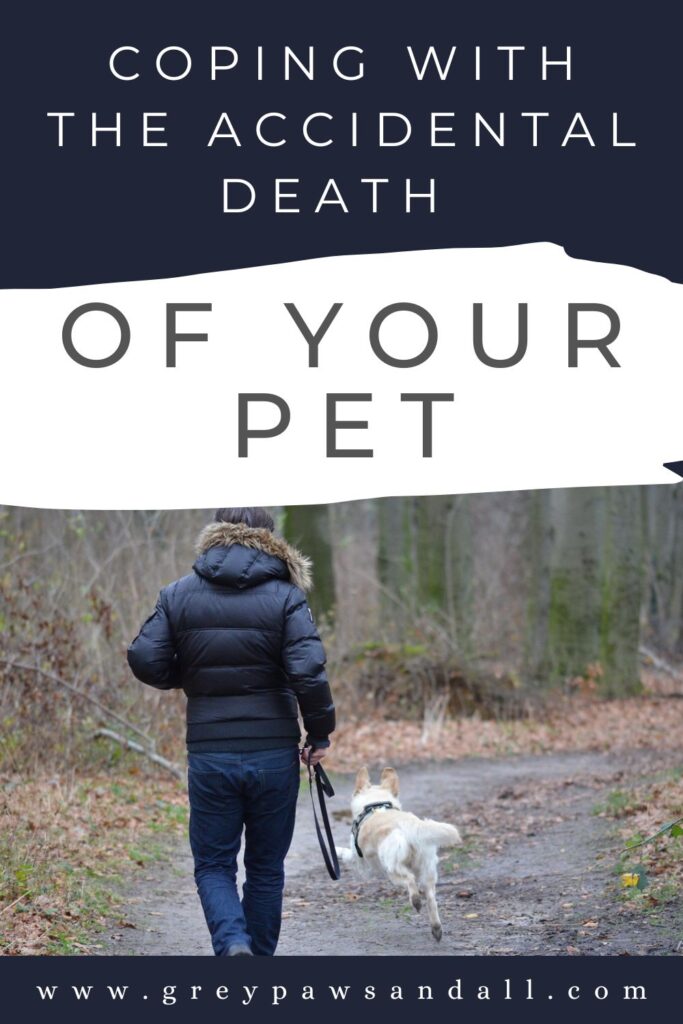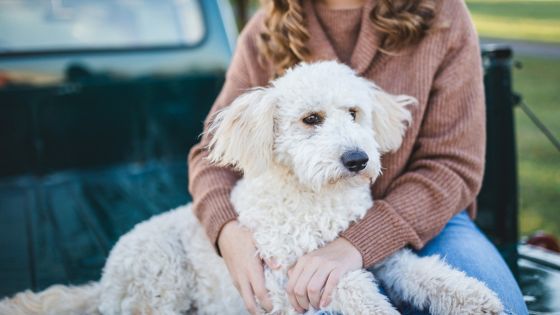Grief, guilt, disbelief, blame, shock, trauma. All are normal reactions to pet loss, including loss as the result of an accident.
As pet parents, I know we pride ourselves on doing our best to control the environment so our pets are as safe as possible. If you’ve experienced loss as the result of an accident, it can be particularly difficult to bear, because there is often so much self-blame that comes into play.
You may be beating yourself up, feeling you could have done more to prevent it. It’s also devastating not having a chance to say goodbye.
While we all grieve differently and no two people experience loss in the same way, there is a lot of support out there so you don’t have to walk this journey alone.
As a pet loss specialist, I’m here to share some tips and advice to help you cope.
Causes of Accidental Death
Sadly, there are so many ways we can experience pet loss due to an accident.
- Hit by a car
- House fire
- Faulty latch or someone left the backyard gate open
- Attacked by another animal
Symptoms You May Exhibit as a Result of an Accidental Death
Whether or not you witnessed the event, it’s not uncommon to experience shock under these circumstances. You may find yourself shaking, experiencing palpitations, headaches, stomach aches, sleeplessness and more. You may even be experiencing PTSD.
How to Cope with the Accidental Death of Your Pet
The following are not written in any particular order.

Know You’re not Alone
It’s true, many people don’t understand the bond between you and your furry friend so don’t waste time trying to convince them. There are plenty of groups and support systems filled with people who can relate, so let them comfort you.
Break Down the Event
According to Pet Loss Partners, when dealing with repetitive thoughts, it can be helpful to break down the event to try and break the cycle of repetitive thoughts.
They give an example of a cat running into the path of a car, because he or she got scared by a sound.
Here’s what they suggest you ask yourself:
- Did you make the sound that frightened your cat?
- Were you able to prevent the sound?
- Could you control the direction your cat ran in?
- Did you have control over the car driver, including what time they left their house and the route they were taking?
- Did you have any control over the injuries your pet sustained?
- When you let your cat out, did you intend to do harm?
- Can you see into the future?
In most cases, the answers to these questions will be ‘no’. If you had the power to change what happened, you would have.
I find it such a powerful exercise because it shows you were not to blame, and would never wish to harm your pet.
Think About Your Pet’s Quality of Life
Another important point mentioned by the folks at Pet Loss Partners, is to remember that whatever you did was to ensure you gave your pet the best quality of life you could.
You let your cat out because you believed it made her happy to have freedom; you hired a dog walker so your pup would have a chance to get out during the day; you gave your rabbit fresh air by putting him in the outdoor run. None of what you did was to put your pet in any danger, and it’s important to remind yourself of that.
Express Your Feelings
Try not to feel ashamed or embarrassed by your feelings, you were lucky enough to find someone to love that much. Whether it’s crying, talking to a friend or writing in a journal, it will help the healing process.
Find Ways to Make Peace with What’s Happened
Host a memorial in your home, light a candle, share stories with others who knew him or her.
One thing that may be particularly helpful in these circumstances is to write a letter to your pet. There’s no “right” way to do this, just write whatever you want. You can express how much you miss them, talk about how you feel about the accident, the impact they had on your life. Apologise if you feel that will help, and if/when you’re feeling up to it, write a letter to you from your pet and imagine what he or she would want to say to you.
If writing isn’t your thing, how about having a conversation out loud with your pet? Whatever resonates with you.

Use the STOP Method
The STOP method can be particularly helpful if you keep reliving the accident or the last moments of your pet’s life. It’s understandable and normal, but very traumatic. This information is also thanks to Pet Loss Partners.
The first step is identifying what happens right before the thoughts come. What’s triggering you? Are you getting enough sleep? Are you eating? Are you watching sad movies or watching too much depressing news?
Try and remove the triggers.
The next step is saying the word STOP as soon as those thoughts and feelings enter your mind, and replace them with a kinder thought of a special moment you shared.
Have you ever noticed someone wearing a rubber band around their wrist and snapping it? That is another way to implement the STOP method rather than yelling the word.
Create a Memorial and Find Comfort in the Memories
Again, this can look anyway you want it to. Create a scrapbook and add favorite photos, or just sit back and remember some beautiful times you shared together.
Turn the Accident into a Legacy
Did the accident happen as a result of something faulty in the public domain? Equipment left in the open? A faulty traffic light? What about writing a letter to a public official, requesting an investigation and change? Imagine what kind of legacy that would be? What about writing an article about a design flaw in a product? Thanks to you, how many pets’ lives will be saved?
Give Yourself Time to Heal
There is no time limit on grief, and there’s no straight line to when you will start feeling better. It’s filled with ups and downs, twists and turns so give yourself permission and time to grieve.
Honor Your Pet’s Memory
Whether that’s planting a tree on an anniversary, volunteering at an animal shelter or donating to a cause close to your heart, there are so many ways for you to honor your beloved pet.
What about placing a memorial such as a tree, bush or plaque at the site of the accident?
It’s Okay to Feel Okay
With time and support you will learn to cope. Finding yourself loving and laughing again doesn’t mean the bond you shared was any less deep. You will always love him, and memories of your life together will always be with you.
Celebrate Their Life
Your pet meant everything to you, and although the loss was shocking, please remember all the ways you brought joy to each others’ lives.
Conclusion
I hope with all the advice I’ve mentioned above, you get to a point where your pet’s story is about a lot more than “an animal who died in a tragic accident.” Your pet was so much more and meant so much more to you, don’t forget the joy and unique personality whose life you were lucky to share.

Pet Loss Grief Support Service
I’m a certified Pet Loss Bereavement Specialist, here to support you through the heartache of losing a beloved companion.
Having experienced the loss of my own cherished fur babies, I deeply understand the range of emotions that come with grief. I also know that no two journeys are the same — that’s why each session is thoughtfully tailored to your individual needs.
You’re welcome to book a free 20-minute call, giving you the space to see if I’m the right fit to support you.
Visit my website for gentle support and articles to help you cope.
I’ve been rescuing and caring for senior dogs since 2009. From vision and hearing loss to obesity, dementia, kidney disease, liver issues, cardiac problems, Cushing’s, mobility challenges and more, you could say I’ve dealt with and learned a lot! In addition to my hands on experience, I’ve taken many courses and earned several qualifications to keep learning how to help senior dogs and they include: Senior Dog Enrichment, Understanding Canine Anxiety, Care of the Senior Pet and I’m a Certified Pet Loss Specialist.


There is a lot here to help a grieving pet owner. I lost Dash suddenly and got no justice. I carry on his website and honour his memory by encouraging people to create memories with their cameras.
I’m so sorry Marjorie. I obviously don’t know the circumstances, but when you mentioned not getting justice I flashed back to 2 dogs I lost due to vet incompetence and I certainly never got justice for them. I didn’t realise that’s why you made such a shift to photography…what a beautiful mission and I imagine it helps you.
Great advice, Hindy. I hadn’t really considered this too much. Although, there were a few times that I nearly lost my fur kids from accidents. Thank goodness we all survived. I’m sharing this with all my pet parents.
To be honest, I’ve never thought of it. To me it’s always been about losing a pet due to health issues, but when I did my training to becoming certified as a Pet Loss Bereavement Specialist they brought up all these other ways that people can lose a pet. It was certainly eye opening to me, and I hope it will be for others.
It is my biggest fear losing Nili to a tragedy and I think because of it I am so scared to leave her alone at home especially living in SF which has earthquakes. Thanks so much for such a great post and the links which are important to know about.
I know you used to say that about Layla as well. It must be stressful, but hopefully you have some kind of emergency plan in place just in case.
I think it also works for instances when you lose your pet to disease. I found myself asking if I could have noticed the signs earlier, or chosen the best treatment. Survival guilt is hard! Thanks for the tips!
Definitely. These tips are not exclusive to an accident.
Such a sensitive and emotional topic that you handled so well. I had a friend who lost her Husky quite suddenly while they were out jogging together. He broke lose from a brand new leash she bought specifically to be sure her boy was safe while out jogging with her, so it was such a shock all around. Sadly, he was hit by a car, and tragically passed away. I know that haunts her every day, but it was not her fault at all, but that was some awful heartbreaking shock. You have outlined some very helpful tips here. While I did not lose my to an accident, I did/am doing the legacy thing in their honor to help others. Thank you for such an important post.
What a tragic accident, I’m so sorry for the feelings she’s living with. I know many of us live with guilt when it comes to decisions we have or haven’t made when it comes to treatment for illnesses, but an accident must be much harder to cope with. I hope she has found some kind of peace since then.